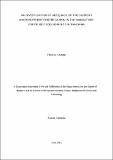An investigation of adequacy of the current micronutrient fortification in the mandatory fortified food vehicles in Tanzania
Abstract
Micronutrient fortification of cooking oil, wheat and maize flours is mandatory in Tanzania
since 2011. Up-to-date information regarding the compliance of micronutrient fortification is
limited in the country. This study aimed at updating the information on the current status of
micronutrient fortification in mandatory food vehicles in Tanzania. A cross-sectional study was
conducted in 5 regions to analyze the adequacy of micronutrient fortification and identify
challenges facing fortification programs. Samples (from selected companies) of fortified edible
oil (n = 19), wheat flour (n = 12) and maize flour (n = 5) were collected from supermarkets and
analyzed for vitamin A, folic acid, iron and zinc using standard methods and procedures.
Questionnaires were used to identify challenges regarding fortification compliance. About 80%
and 83% of the maize and wheat flour samples respectively complied with the iron fortification
standards. Only 25% and 40% of the wheat and maize flour samples respectively complied
with zinc fortification. Nearly 17% and 20% of the wheat and maize flour samples and 10.5%
of the cooking oils respectively complied with folic acid and vitamin A standard. Significant
variations (p < 0.001) were observed in 5 batches of cooking oil, 1 batch of wheat flour and 2
batches of maize flour. Moreover, high cost of premixes (83%), low consumer awareness
(75%) and poor laboratory facilities (67%) were highlighted as barriers to food fortification
compliance. This shows that food fortification is still facing challenges in Tanzania and hence
calls for a review of the current fortification programs in Tanzania.

